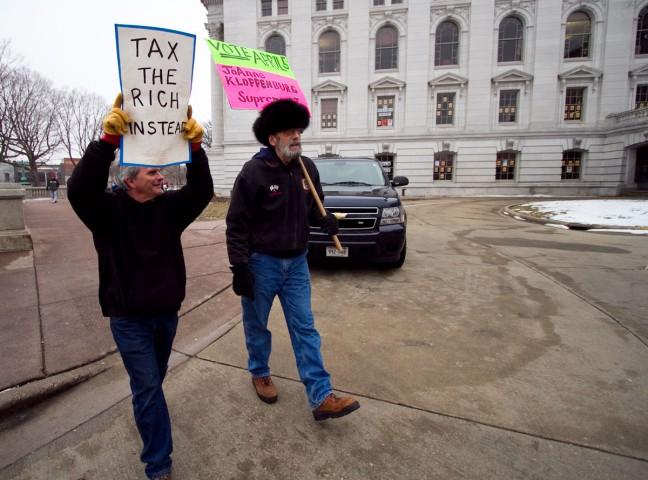A band of retired Wisconsinites marched around the Capitol building Monday in protest of Gov. Scott Walker’s bill to limit collective bargaining and proposed biennium budget that they said would have injurious effects on the state’s elderly population.
The protesters, organized by the non-profit advocacy group Wisconsin Alliance of Retired Americans that represents more than 85,000 state residents, first held a convention in the Concourse Hotel to draft a resolution solidifying their opposition to Walker’s budget proposals.
“We resolve that the convention delegates oppose the governor’s 2011-13 budget and support returning state funds for the earned income tax credit, homestead tax credit, transit aid and BadgerCare as well as maintaining the current SeniorCare and Department of Veteran Affairs programs and increasing funds for FamilyCare,” said WARA President Leon Burzynski, 69, reading from the resolution.
The convention consisted of 150 retirees, 30 or 40 of whom proceeded to march toward the Capitol, where they planned to hand Walker their resolution while waving signs reading, “The only good Walker is one with wheels!”
The budget bills Walker is proposing would provide the state with the authority to make changes to medical assistance eligibility, benefits and reimbursements, as well as reduce Medicaid expenditures by $500 million over the next two years.
Burzynski said he and his fellow retirees enjoy a great quality of life because of the pensions and health care programs Walker’s bill is attacking. He said though Walker’s budget would not affect him personally,WARAis protesting because the proposals would affect other less fortunate elderly citizens and the future of his grandchildren.
Half ofWARA’s members previously participated in labor unions and disagreed with Walker’s aim to limit the collective bargaining authority of employees in the public sector. Many of the protesters Monday were part of the generation that saw the legalization of collective bargaining in 1959.
“In the 1950s, a teacher could be married, but a husband and wife could not work in the same system,” said Lev De Back, 80, who taught middle school science for 39 years. “Women, once they were three months pregnant, had to resign or be fired. All that changed with the union movement, but people forget that.”
De Back started teaching in 1951 and said the superintendent would bring next year’s contract to him during class and give him an ultimatum – sign the contract or leave. He said he signed the contract until he got married and realized his wages would not support a family. De Back said these circumstances motivated him and others to organize unions and demand better salaries.
He said he was protesting Walker’s desire to limit unions’ bargaining authority because it is offensive to his family roots.
“I come from a union family – my parents were immigrants from the Netherlands and my dad came over to America when [management] picked guys out by what size they were,” De Back said. “Unions changed all that and gave labor dignity so I kind of owe it to my dad to continue the tradition.”
Stoughton resident Buzz Davis, 68, said he did not have fond memories of the time before unions – a time during which he said management could do whatever they wanted. Likewise, Davis said Walker is not interested in solving Wisconsin’s budget issues by working together with his colleagues, but would rather unilaterally destroy what he disagrees with.
“So we’re destroying public unions, private unions, then enable management to come to their workers and say, ‘I know I was paying you $15 an hour, but business is so bad that I’m reducing it to $10,” Davis said.
He said Walker is limiting collective bargaining to weaken unions and their ability to support Democratic causes and candidates.
Republicans over the past four weeks of protests have criticized union groups for using member dues for their union’s political gain. But Davis said it is necessary for the unions to become politicized to counter the politicians who are interested in helping business and management.
The state’s largest teachers’ union, the Wisconsin Education Association Council, started its foray into politics only after the collective bargaining advantages gained through negotiations were decreased more and more at the Capitol, Davis said.WEAChad to start lobbying for pro-worker, Democratic candidates.
Davis also made a sobering conclusion for why the government seeks to limit workers’ bargaining rights over benefits and working conditions.
“The advantage of having the people work longer is they will die and then when they die the companies won’t have to pay for their retirement. Why would I want to put a work horse out to pasture and pay for food to feed that horse after he’s done working? I’ll work him to death in the harness and we’ll get another horse,” Davis said. “This is the way most of the world has always looked at people. The few elite looking down their nose at all their workers saying, ‘Well, they’re not like us.'”














